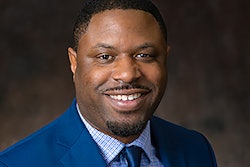Ain’t I a professor?
Living an Authentic Academic Life as a Black Intellectual
By Robin Hughes
In the last couple of months, I have mulled over an audience participant’s comment, which occurred during a national conference. To put it mildly, it has been quite bothersome. The comment/question was directed towards me. I took it as what seemed to be a passive aggressive assault on a paper that I had presented. During that presentation, I noted that it was a waste of time engaging in what some professors refer to as “playing the game”. I went on to state that other colloquialisms need to be reconceptualized as well. I stated that as scholars, we should not play games. We should care less, instead of being careful. We should consider tipping the boat over, instead of not rocking the boat, and that we should blow up the bridge instead of not burning any. My point being that these colloquialisms have influenced academic life, research, writing, and service to such an extent that it continues to mimic and perpetuate the same “mainstream and meaningless” jargon with little variation or voice from marginalized or underrepresented individuals. The audience member went on to state that he really wanted to learn about what he should be doing to keep his job. He asked what he should be doing in his present job. “ I want my job,” he lamented, in an almost sing-songy sort of voice. He laughed as if he had some great secret that he wanted to share with the rest of the peons. “He, he, he, I just want to get along…and plus, you cannot possibly be taken seriously or make it without some game playing.” In other words, ‘you gotta do what you gotta do in order to fit in.’ I took it to mean, ‘if you must publish in certain in places, then so be it. If you must write in a certain way, then so be it. Shut up until spoken to, otherwise your word is just mud.’ I play that day over and over again.
I had to ask myself, do I play games as a professor, and if I do, what do they look like? I have come to the conclusion, for now anyway, I guess in a sense some political maneuvering might be necessary—I think. However, I still refuse to endorse the boot licker, which he, the inquirer, clearly wanted me to support. So, following several months of mulling, I must conclude that playing the game, as he described, is still an indignant game. Now, instead I ask, why should I or anyone for that matter have to play games? Now, I am not saying that there are not certain things that you must do while a professor, but my contract, and interpretation of the promotion and tenure document, which I have now read several times, still does not list boot-licking as a criteria for personal and academic growth. I ask, ain’t I a professor? Ain’t we professors?
Now there are certain things that are expected of a faculty member in order to live in an academic space. However, I also know that one can live in an academic place and maintain one’s integrity. I would argue that the real question becomes somewhat close to the very question with regards to women that Sojourner Truth asked. I ponder, ain’t I a professor, and what does being a professor mean? In order to live in an academic place must your life be predicated by others who dictate exactly what you should be doing, writing, saying, thinking, publishing, teaching? I cannot help but refer to chapters one and four of Pedagogy of the Oppressed, and think that this very notion sounds vaguely and grotesquely reminiscent of Freiere’s philosophies—a little Pedagogy of the Oppress’ish to me. However, many of us are inclined to follow those perceived rules of engagement. We make like Nike, and just do it. I would argue again that we do “it” because it is too risky to do otherwise. We all fear being pulled over for thinking, engaging and just plain old writing while black?
Think about requirements for tenure? Be prepared for folks to tell you exactly where you should write, submit to tier one journals only, and how you should write, use certain theoretical frames and write in a jargony fashion and you will be assured of tenure. I wake up some early mornings from the same frightmare that goes something like this: A full professor in sunglasses, driving a 1960’s model car with flashing red lights, pulls me over and says, “Keep your hands on the wheel and let me see your license to profess.” He hands me a citation. I am quickly reminded that I better keep to the rules of the academic police lest I getpulled over for writing while Black (WWB).
A student actually informed me that she was told to write stuffy in order to get published in certain journals and wanted me to help edit to make the piece stuffier. I cringed. I also said, no. I asked her what she meant by stuffy. You know, she replied, scholarly. I imagine that stuffiness to sound a little like Professor Henry Higgins forcing Eliza Doolittle to talk like civilized “folks” in the 1950’s scene from My Fair Lady. The result now, however, is even more comical and utterly ridiculous in many instances. Stuffiness might sound like, if you could imagine, a new-aged Cruella Deville, the dog napper from the Disney movie, a fiendish and “stuffy” accent coached by Professor Henry Higgens. Followed by of chorus, a long song and dance number to the tune of “The Rain in Spain” lies mainly in the plain, yadda, yadda, yadda……. I can’t help but ask, what is the purpose of higher education? I am under the assumption that at its crux is that of affecting change. However, some of our very students, the ones with whom we are to train, think that one purpose is to serve as a repository for garbally, gookish, gunky educational crud? I suddenly hear the annyoing voice of Steve Urkel, did we, faculty, do that? When in fact we know that the purpose of higher education, and education in general, is supposed to be much more. Admittedly, I, too, must be brought back to earth after seeing one’s name in lights (a hit on a CV). That is really not the goal. I often seek refuge in the writings of other scholars, those who assist me in the sanity and humanity of it all. One such scholar, Cornel West, writes:














